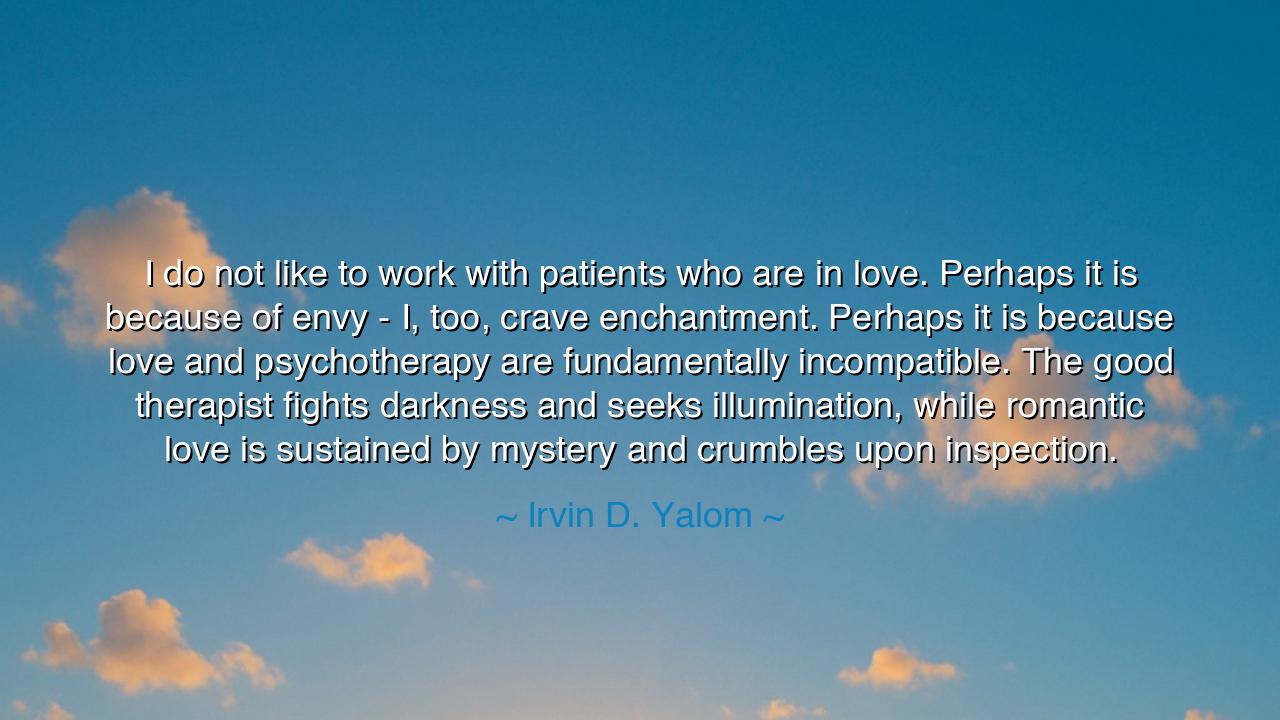
I do not like to work with patients who are in love. Perhaps it
I do not like to work with patients who are in love. Perhaps it is because of envy - I, too, crave enchantment. Perhaps it is because love and psychotherapy are fundamentally incompatible. The good therapist fights darkness and seeks illumination, while romantic love is sustained by mystery and crumbles upon inspection.






“I do not like to work with patients who are in love. Perhaps it is because of envy—I, too, crave enchantment. Perhaps it is because love and psychotherapy are fundamentally incompatible. The good therapist fights darkness and seeks illumination, while romantic love is sustained by mystery and crumbles upon inspection.” Thus speaks Irvin D. Yalom, physician of the soul, unveiling a paradox that has haunted human hearts since the first whispers of love: that romantic love thrives in shadows, while psychotherapy seeks to burn away shadows with light.
Here, Yalom admits with rare honesty that the healer, for all his wisdom, envies those who are enchanted. For when one is in love, the world glows with a golden haze, and reason bends to mystery. To the therapist, who is sworn to truth, this haze appears dangerous, fragile, even false. Yet to the lover, it is the very essence of life. Thus arises the clash: the one seeks illumination, the other clings to mystery. Both paths are noble, yet they cannot easily walk together.
The ancients knew this conflict well. Consider the myth of Orpheus and Eurydice. Orpheus, armed with song, descended into the underworld to reclaim his beloved. But he was given one command: do not look back. His love, like all love, was sustained by trust and mystery. Yet his need for certainty, his craving for illumination, destroyed what mystery alone could preserve. One glance, one inspection, and Eurydice vanished forever. This story reveals what Yalom names: that love withers under too much scrutiny, for it requires faith in what cannot be fully known.
In history, too, we see the peril of piercing love’s veil. Napoleon Bonaparte, a man of reason and war, adored his Josephine with a passion that burned through empires. Yet when he discovered her infidelities and examined her love with the cold eye of truth, the romance crumbled. Mystery had sustained them, but reason broke the spell. Love lives in what is unseen, unmeasured, unexamined. It flourishes in the haze of poetry but falters under the scalpel of analysis.
Yet Yalom’s insight does not scorn love. Instead, it teaches us to honor its nature. Just as the therapist brings truth to the suffering soul, love brings enchantment to the weary spirit. Both are medicines, but they are not the same. To demand that love be rational is to kill its beauty; to demand that therapy preserve mystery is to betray its calling. Wisdom lies in knowing when to seek the light of clarity and when to cherish the dark glow of passion.
The lesson is this: do not confuse the realms of love and truth. When in love, accept that mystery is part of its sustenance. Do not pry so deeply that you destroy the wonder. And when in need of healing, accept that illumination may strip away illusion but will give you strength to stand in reality. Each has its season: one nourishes the heart with enchantment, the other strengthens the soul with clarity.
Therefore, dear listener, take Yalom’s words to heart. Do not scorn love for its mystery, nor truth for its harshness. Rejoice in enchantment when it comes, but know that it cannot be dissected without loss. And when darkness presses in, seek illumination, even if it burns away dreams. For the soul requires both: the mystery of love, which teaches us to live with wonder, and the light of truth, which teaches us to endure with wisdom. To hold both in balance is the art of a life well lived.






AAdministratorAdministrator
Welcome, honored guests. Please leave a comment, we will respond soon